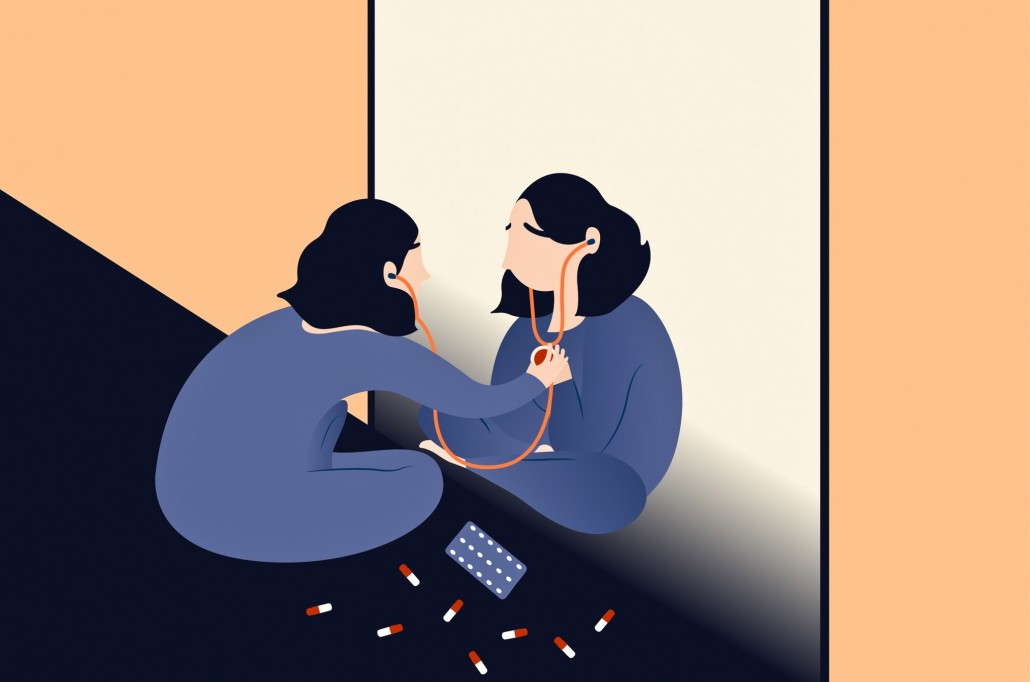
Hypochondria: what it means, physical symptoms, causes, how to combat it
Let’s talk about hypochondria: hypochondriacs are generally healthy individuals who actually believe they are ill
Usually the hypochondriac tends to overestimate mild or non-specific symptoms, interpreting them as signs of serious, often rare and unlikely illnesses.
For example, a young, fit hypochondriac with a slight pain in his left arm, for example from simple epicondylitis, may convince himself that he has a myocardial infarction in progress.
The hypochondriac spends a lot of time reading medical articles in order to ‘find out more’ about the disease he thinks he has, with the aim of making a sort of self-diagnosis-early diagnosis.
In addition to the more typical and widespread neurotic form, i.e. linked to an anxiety disorder of the subject, some severe manifestations of hypochondria, e.g. in the presence of delusions and hallucinations, can be classified as genuine psychic disorders; in this case, hypochondria is defined as a somatoform disorder, comparable to psychosomatic illnesses.
How widespread is hypochondria?
Men and women are affected by hypochondria in the same percentage (2%), and the age group most affected by the disease is between forty and fifty.
The term ‘hypochondria’ is derived from the Greek ὑποχόνδρια:
υπό: suffix meaning ‘under’;
χονδρίον: meaning the cartilage of the costal diaphragm.
It was therefore a term used to indicate an ailment that was often localised by the patient at the level of the abdominal fascia, and was consequently treated with therapies used in abdominal pathologies.
Only in recent times was it realised that the cause of referred abdominal pain was related to psychological aspects of the individual and not to an organic abdominal pathology.
Symptoms reported by the hypochondriac patient
The typical symptoms reported by the hypochondriac are often related to theoretical nervous, respiratory, gastrointestinal and/or cardiovascular disorders.
The symptoms may not actually be referable to any pathology, or, they may be less severe than the hypochondriac patient thinks or finally be indicative of a much less severe pathology than believed.
Although they differ from subject to subject, such symptoms of hypochondria classically are
- gastrointestinal symptoms (diarrhoea, constipation, poor digestion, meteorism, flatulence, altered stool colour/consistency…)
- arrhythmias (tachycardia, atrial extrasystoles, heart palpitations…);
- muscular or osteoarticular pain;
- chronic headache;
- breathlessness;
- anxiety;
- tachypnoea (increased respiratory rate);
- dyspnoea (feeling of difficulty breathing).
Characteristics indicating hypochondriac behaviour
The hypochondriac subject, as already repeatedly reported, tends to
- report symptoms that are not really present
- report symptoms that are more severe than the severity of the symptom;
- suspect an illness that does not actually exist;
- suspect a pathology that is much more serious than the existing one;
- suspecting a rare and unlikely pathology.
The reported symptoms – according to the hypochondriac – strongly tend to persist and be reported even after a thorough medical evaluation, in which it is practically certain that these symptoms do not indicate any actual pathology, or at least not a pathology serious enough to justify the hypochondriac’s level of anxiety and fear.
Often the hypochondriac wants a ‘second opinion’ and goes on a constant search for a doctor who will finally confirm the pathology he is convinced he has.
Often the hypochondriac traces ‘trivial’ symptoms back to rare and impracticable diseases, e.g. a simple wheeze in his head becomes ‘I have lymphangioleiomyomatosis’.
It should be remembered that the hypochondriac, unlike the Münchhausen Syndrome sufferer, is in ‘good faith’, i.e. he really believes he has a certain pathology and in his heart, he knows he is not inventing any symptoms.
Causes of hypochondria
Among the main causes of hypochondria are anxiety and depression, and from a psychological point of view, it can be defined as a defence mechanism against an internal or external danger associated with relational and social life or personal identity.
The aim of the hypochondriac, whether conscious or unconscious, is to distance himself from the real cause of danger (e.g. an illness), or from the cause of a failure in life (e.g. in study, work, family) and to intensify the reassuring and caring manifestations carried out by the surrounding environment towards him.
Treatment of hypochondria
In the treatment of hypochondria, cognitive-behavioural psychotherapy is probably the best tool.
This is a brief psychotherapy, usually weekly, in which the patient plays an active role in solving his or her problem and, together with the therapist, focuses on learning more functional ways of thinking and behaving, with the aim of breaking the vicious circles of hypochondria.
In any case, treating hypochondria can be particularly difficult, as individuals are never quite sure that the cause of their ills is only psychological, indeed they tend to be firmly convinced of the opposite.
Generally, psychotherapy is only really possible in those cases in which the person worries incessantly that he or she is ill, but realises, at least in part, that his or her worries are excessive and unfounded.
Hypochondria and pharmacological support
The pharmacological treatment of hypochondria is basically based on antidepressants, both tricyclics and SSRIs.
The latter class is more manageable and has fewer side effects than the former.
Since hypochondria is often equated with obsessive-compulsive disorder, considering the patient’s worries as disease obsessions, the drug therapy reflects the guidelines for this disorder, with high doses of serotonergic antidepressants taken for prolonged periods.
In mild forms, the prescription of benzodiazepines alone may be sufficient, but generally does not constitute a form of cure for hypochondria and only succeeds in appeasing anxiety in the short term.
Drug therapy is sometimes impossible in the hypochondriac patient, because the subject often tends to reject drugs, fearing that they will only cause further damage to their already ‘sick’ body.
Read Also:
Emergency Live Even More…Live: Download The New Free App Of Your Newspaper For IOS And Android
Anxiety: A Feeling Of Nervousness, Worry Or Restlessness
Rescuer Safety: Rates Of PTSD (Post-Traumatic Stress Disorder) In Firefighters
Hypochondria: When Medical Anxiety Goes Too Far
Psychiatrist: ‘With Covid, The Threat Of Hypochondria Looms Large. Nobody Feels Safe”



